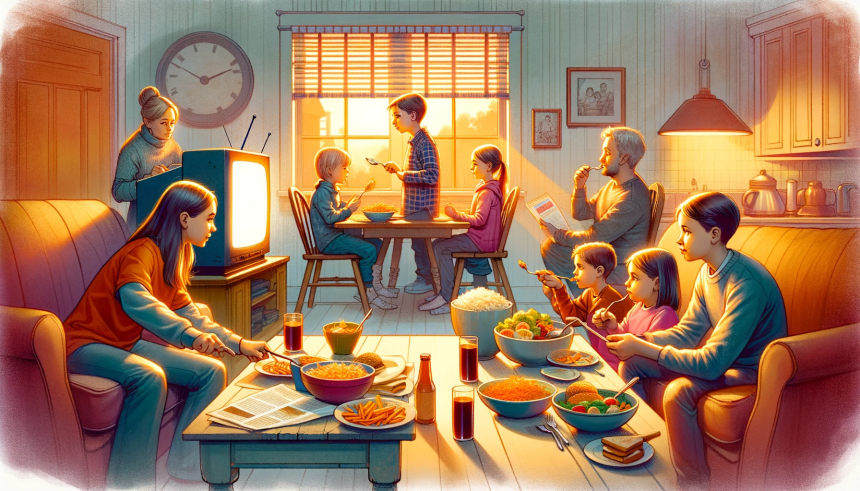Prelude to a Modern Dilemma
In the tapestry of today’s family life, a scene frequently unfolds: children engrossed in television, with dinner plates in tow. This commonplace tableau, though seemingly benign and often a salve for busy schedules, conceals layers of implications for the young diner’s health and personal growth. We embark on an exploration into this nuanced issue, dissecting whether parents should sound the alarm over their offspring’s TV-accompanied meals.
Decoding the Intricacies
The marriage of mealtime and screen time, now a staple in many homes, warrants a closer look at its multifaceted impact on the young ones, spanning the physical to the psychological spectrum.
The Dietary Dimension
- The Lure of Overeating and Nutritional Pitfalls: Television, a master of distraction, can eclipse a child’s innate fullness cues, inadvertently paving the way to overindulgence. Compounding this, the siren call of TV advertisements often champions less-than-nutritious food choices.
- The Erosion of Communal Dining: The gravitational pull of the TV can upend the traditional family meal, a pivotal arena for cultivating wholesome eating rituals and familial bonds.
The Cognitive and Social Tapestry
- A Waning Attention Span: The omnipresent TV, a constant hum during dining, can subtly erode a child’s capacity for sustained focus in a quieter, less stimulating milieu.
- The Social Fabric Unraveled: Mealtime, intrinsically a social symphony, loses its communal charm when a screen plays the lead, thus curtailing vital opportunities for conversational and social skill development.
Striking a Harmonious Balance
Outright exiling the TV from mealtime may not be the panacea, but fostering equilibrium is crucial.
Crafting Boundaries
- Television: A Guest, Not a Fixture at Meals: Designate selective mealtimes as sacrosanct, TV-free zones, thereby championing mindful eating and familial dialogue.
- Curating Content with Care: In instances where mealtime TV is inescapable, prioritize content that is educational or serene, averting the risks of overstimulation.
Cultivating Wholesome Eating Ethos
- The Art of Mindful Dining: Encourage progeny to immerse themselves in the act of eating, attuned to their hunger signals, even amidst televised distractions.
- Culinary Collaboration: Involve the young ones in meal curation and preparation, nurturing a deeper, more respectful liaison with food.
Fostering Familial Connections
- Reclaiming Family Meals: Dedicate select evenings for TV-free family dinners, setting the stage for unfettered conversations and bonding.
- Dialogues and Discovery: Utilize dining times for delving into the child’s day-to-day adventures, interests, and thoughts.
Concluding Thoughts
While the sporadic convergence of TV and dining might not spell doom, it behooves parents to remain cognizant of its potential ripples on their children’s eating patterns, health trajectory, and social evolution. In navigating this terrain, the emphasis should be on crafting a bespoke balance, attuned to each family’s unique rhythm while prioritizing the child’s holistic well-being.








